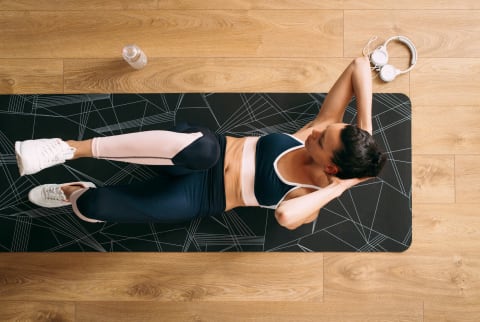Advertisement
The One Piece Of Equipment You Need To Master At-Home Workouts


After hearing my co-workers rave about strength training (and even reporting on the benefits myself), I have finally hopped on the weightlifting bandwagon. I'm still a Pilates girl through and through (don't come for me), but I've recently committed to strength training a couple times a week.
And honestly, I feel great! I'm increasing my weight from week to week, and I feel strong! It gives me a unique sense of accomplishment when I can really feel my body tone up.
The only downside is the vast amount of tools and workout plans out there to choose from. It's easy to become intimidated by all those decisions (I'm sure I'm not alone here), but luckily, functional medicine doctor Gabrielle Lyon, D.O., recently shed light on her favorite piece of at-home gym equipment.
"I will do some kind of kettlebell activity," she shares on the mindbodygreen podcast. Discover why she recommends this type of weight below.
A strong case for kettlebells
First things first: Kettlebells are versatile. You can use them for a variety of moves (think swings, farmer's carries, deadlifts, goblet squats, and more). "I will also do a push-press or some kind of squat with kettlebells," Lyon says. You can even hold the kettlebell in different ways (by its base, its handle, or even upside down) to tweak the difficulty level and how the muscle is being stressed.
These exercises help you build lean muscle (which Lyon deems the "organ of longevity"), but they also work on your grip strength, which can significantly enhance your quality of life as you age. Research shows that it can even help reduce all-cause mortality1.
Kettlebells are also compact and easy to store, which is great news for my one-bedroom NYC apartment. Lyon shares she doesn't have a rack of weights at home; she finds it safer to place kettlebells on the floor in a house with young kids. Plus, some signature kettlebell moves, like kettlebell swings, can't be comfortably replicated with a dumbbell—so it's a win-win.
Feel free to head over here to browse our favorite kettlebells to buy. If you're a strength training beginner (like me), experts recommend starting out lighter than you think before working your way up.
"A good test is to try and pick up the kettlebell with the nondominant arm and raise to shoulder level 10 times with moderate effort," advises Jamie Costello, MSC, vice president of fitness and sales at Pritikin Longevity Center. "You can always go heavier, but it's a bad idea to start out too heavy."
The takeaway
If you, too, have recently kick-started your strength training journey: Hi, welcome! It can be overwhelming to navigate all the exercise plans, equipment, and expert tips out there (especially if you don't have access to a gym), but take it from Lyon: Kettlebells are a sound investment.
Looking for specific moves to use your new kettlebell? See here for a full-body, beginner-friendly routine.
Watch Next
Enjoy some of our favorite clips from classes
Enjoy some of our favorite clips from classes
What Is Meditation?
Mindfulness/Spirituality | Light Watkins
Box Breathing
Mindfulness/Spirituality | Gwen Dittmar
What Breathwork Can Address
Mindfulness/Spirituality | Gwen Dittmar
The 8 Limbs of Yoga - What is Asana?
Yoga | Caley Alyssa
Two Standing Postures to Open Up Tight Hips
Yoga | Caley Alyssa
How Plants Can Optimize Athletic Performance
Nutrition | Rich Roll
What to Eat Before a Workout
Nutrition | Rich Roll
How Ayurveda Helps Us Navigate Modern Life
Nutrition | Sahara Rose
Messages About Love & Relationships
Love & Relationships | Esther Perel
Love Languages
Love & Relationships | Esther Perel











